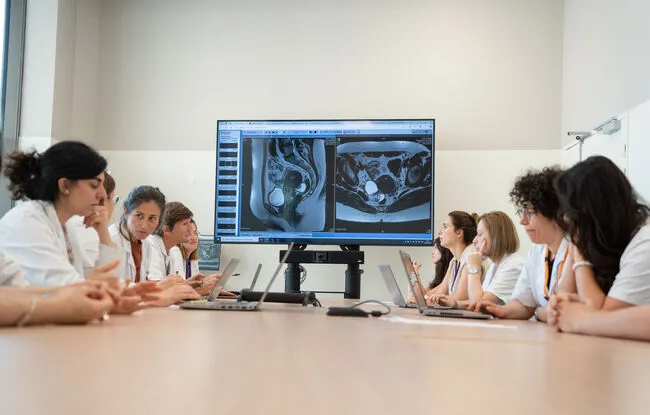- Home >
- Patients and Care >
- Cancer types >
- Ovarian cancer >
- Treatments
Ovarian cancer

Ovarian cancer treatments
The treatment of ovarian cancer is essentially based on surgery and medication treatments, i.e. chemotherapy and/or targeted therapy. It adapts to the characteristics of each patient's cancer, to its stage (early or advanced), to genetic analyzes, etc. Therapeutic treatment is decided at a multidisciplinary consultation meeting.
Surgery for ovarian cancer
When the diagnosis is made at a locally advanced stage, we then deal with peritoneal carcinosis. The tumor of ovarian origin has spread to various places of the abdominal cavity on the organs of the digestive system, the peritoneum, the spleen, the bladder, etc. The objective of the treatment is curative and combines surgical treatment with medical treatment.
If it is feasible, surgery is discussed right away. The surgical procedure involves removing any cancerous lesions from the organs in the abdominal cavity (called the peritoneal cavity). Surgery should only be considered if all of the peritoneal carcinosis lesions can be removed. If, following a rigorous clinical, radiological, and surgical evaluation, the excision (removal) of all the carcinomatosis lesions cannot be completed at the same time during the surgery, preference will be given to neo-adjuvant chemotherapy (prior to surgery).
Ovarian cancer surgery requires special expertise which, under ministerial decree No. 2022-689 of April 26, 2022, must be performed in an authorized referral center. Institut Curie is a referral center with such expertise.
When the diagnosis is made at an early stage (without associated peritoneal carcinosis), surgery can be performed laparoscopically, and it involves removing the ovaries, the uterus, and performing lymph node staging (all pelvic and lumbo-aortic nodes are removed to clarify the stage of the disease).
Women affected by ovarian cancer are typically in their sixties. However, for younger patients before menopause, and if pregnancy is desired, in certain types of ovarian cancer (so-called low-grade tumors) and in the early stages (stage IA), surgery preserving the uterus and a healthy ovary may be discussed in order to preserve fertility.
Maintenance treatment of ovarian cancer
Targeted therapy drugs can be administered following chemotherapy as part of maintenance treatment - bevacizumab, a monoclonal antibody that blocks the formation of blood vessels surrounding the tumor, or a PARP (Poly DNA-Ribose Polymerase) inhibitor, which reduces the risk of relapse by blocking the repair of DNA in cancer cells and thus causing them to die. These new targeted therapies have increased the life expectancy of patients. The choice of maintenance treatment depends on the extent of the cancer, the presence of genetic alterations affecting the BRCA1 and BRCA2 genes, or the presence of an HRD profile (homologous recombination defect).
Immunotherapy and hormonal therapy for ovarian cancer
Immunotherapy has been tested as part of clinical research protocols, but is not routinely used in the current treatment of ovarian cancer. On the other hand, hormone therapy can be mobilized against low-grade serous carcinomas, and the data obtained in this context will be stored in a national database of these rare cancers, called CASBA.
All of these treatments - surgery, chemotherapy, targeted therapies, hormone therapy, etc. - are discussed in a multidisciplinary consultation meeting. This multidisciplinary approach within Institut Curie constitutes a real asset for patient care.
Chemotherapy for ovarian cancer
Surgery is followed by chemotherapy combined with targeted therapy in the majority of cases. This can also precede surgery when complete resection of the affected organs is not possible as a first option. Chemotherapy thus begins to reduce the extent of the tumor. Two drugs are primarily used in chemotherapy - a platinum salt and a taxane (carboplatin and paclitaxel), which act on the mechanisms of cell division.
Institut Curie has also developed expertise in intraperitoneal chemotherapy (IP Chemo), which is carried out during surgery in the abdomen, to strengthen the effectiveness of intravenous chemotherapy and help better fight ovarian cancer.
Institut Curie, the leading cancer center in France

- 50€
- 100€
- 150€
- 500€
- Montant libre
After tax deduction, your donation costs you 51.00€

